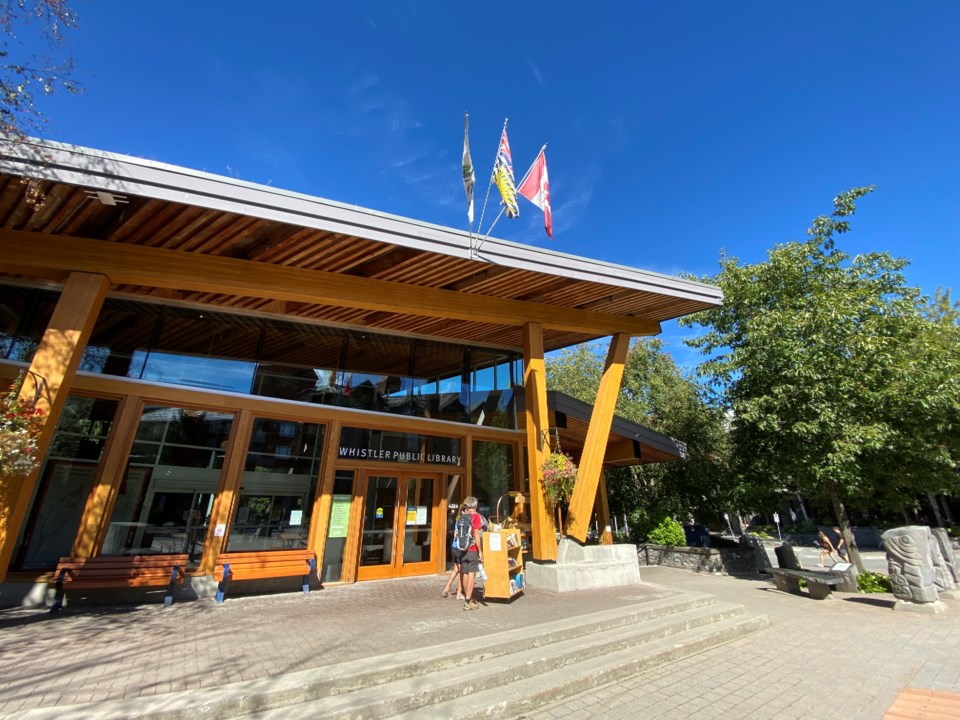It’s often said that modern-day libraries are more than just book repositories; that they now represent a “third place” for community members to visit and socialize, to expand their horizons or engage in other activities, after the home and the workplace.
Since the advent of the COVID-19 pandemic last year, the Whistler Public Library (WPL) hasn’t been able to live up to that mantle.
“We received many, many kind compliments from people appreciating the normalcy they received from us by being able to come in and get materials and attend virtual programming,” said WPL director Elizabeth Tracy, in a presentation to Whistler’s Committee of the Whole on Sept. 7.
“[But] within the throes of the pandemic … the library has really felt like a shell of itself.”
The WPL team adapted well to the ever-evolving COVID-19 health measures last year, first shifting the library’s website to a 24/7 “virtual branch” and offering new online programs, then providing contactless pickups, and later offering 30-minute “express visits,” Tracy said.
In 2020, visits to WPL’s eBooks and audiobooks page rose 182 per cent; its online courses page 228 per cent; its language learning page 21 per cent; and its magazine and newspapers page 97 per cent.
“We did a really excellent job of serving part of our community, but we are exceptionally focused now on serving the rest of our community,” Tracy said, adding that, for many, the experience of the library—and the need for its services—was so much more.
“It’s a place for some people to be warm or cool, it’s a place for social connection, their only free access to WiFi or a computer, their support for connecting with community supports, and their help with government documents and obtaining jobs. This is where we’re turning our focus now.”
The WPL will return to seven-day operations the week of Oct. 11, she added.
At the moment, 50 per cent of the library’s study and soft seating has been restored, and the remainder will come back into play once B.C. moves to Step 4 of its restart plan.
The hope is that, before long, WPL can once again be the “third place” so many Whistlerites are missing.
“Libraries are one of the few places where people don’t have to buy anything to be there,” Tracy said.
“Our programs and materials are curated by professional people who are committed to being open and inclusive, and when we say everyone belongs at the library, we mean it. That means all sizes, colours, abilities, ages, cultures, orientations, genders religions and beliefs.”
Tracy, who also serves as chair of the Association of BC Public Library Directors, also asked for council’s help in advocating for libraries across the province.
With provincial funding for B.C.’s libraries staying stagnant at about $14 million annually since 2009, the association is lobbying for a commitment of $22 million in 2022, and ongoing incremental increases after that.
“Our members along with our staff are on the frontlines of community issues like social justice, climate change, economic uncertainty, wildfire, residential school trauma, pandemic-related mental health issues and substance abuse,” Tracy said, adding that the requested funding increase will help libraries “improve our ability to meet the needs of individuals, families, and communities across the province when the need is greater than ever.”
Library funding in B.C. comes from the provincial ministry of municipal affairs, now headed by Minister Josie Osborne, former mayor of Tofino.
“I know that we have upcoming meetings with her [at the Union of BC Municipalities Convention],” said Acting Mayor Cathy Jewett after Tracy’s presentation.
“So we’ll be sure to add this to our advocacy.”




